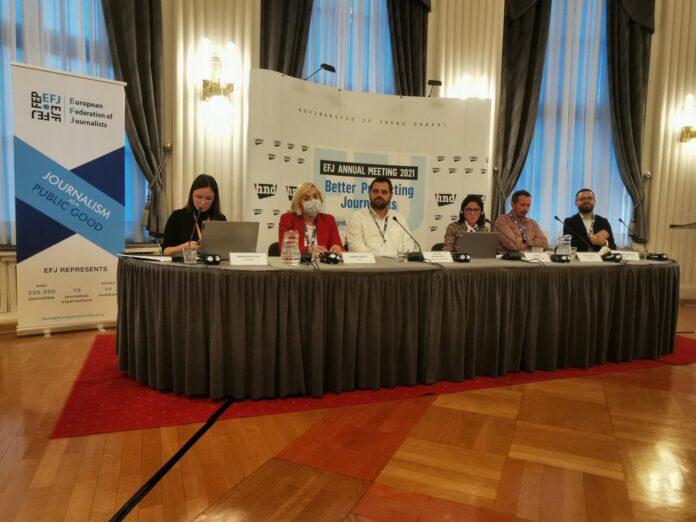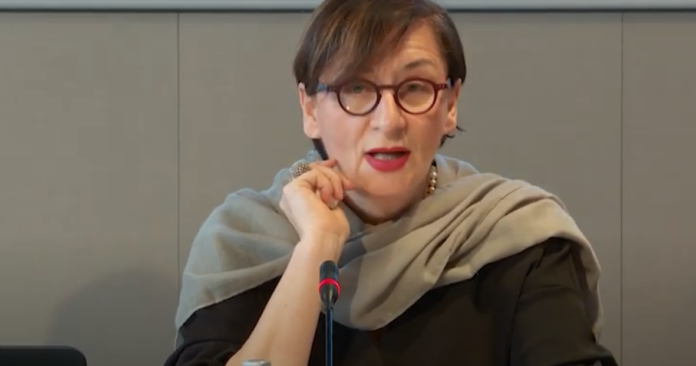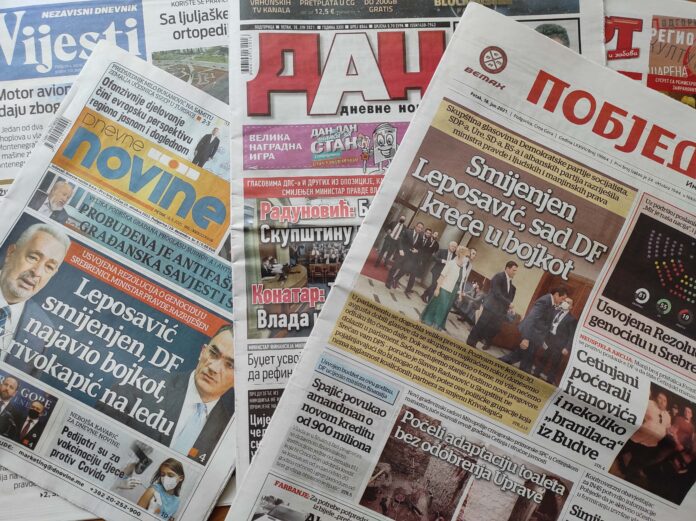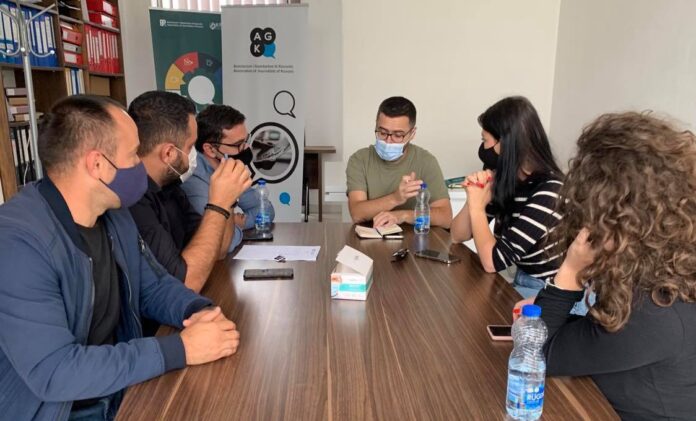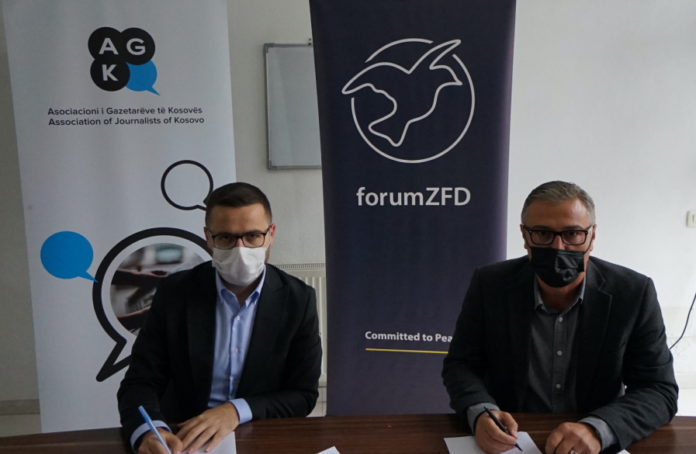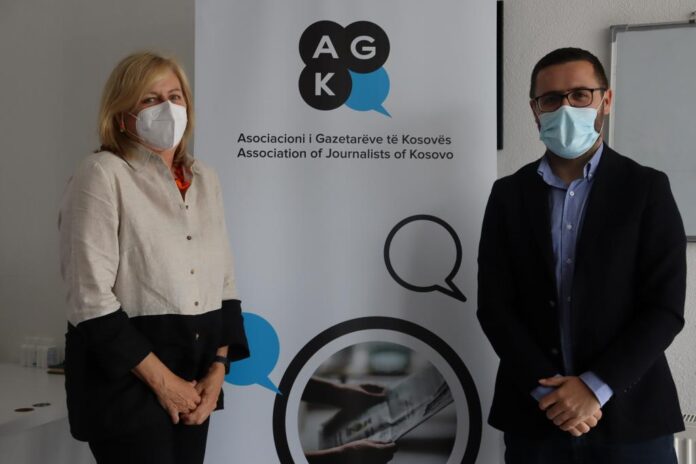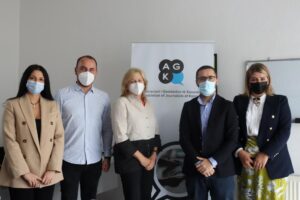PODGORICA, 07.10.2021. – Journalist at daily Vijesti, Jelena Jovanovic, in August this year got 24-hour police escort. She has filed a criminal charge against suspected of two mureders and his lawyer, after she received a letter, mailed as “reaction”, which contained information where journalist lives. Jovanovic interpreted this as serious threats and attempts to intimidate and discredit.
Despite everything, this journalist doesn’t give up, as she says, the maximum giving to journalism. In interview for Safe Journalists, Jovanovic points out that the state does too little to protect journalists, and that polarization can lead to even worse position of media community.
TUMM: How does life look like with a police escort?
Jelena Jovanovic: This is not the first time that I have 24-hour police escort, so it took me much less time to get used to a completely changed lifestyle, which implies that at no time, outside my home and outside the newsroom, can I be alone and free. Of course, none of this is easy to get used to, because it just isn’t natural. The very feeling that I’m not free to go alone, with my family, partner, friends… wherever I want, even if it was a walk to the city, awakenes anger in me. I am angry at myself and the whole society because we allowed that someone who is just doing his job must fear for his life. Still, the first time I was assigned police security in 2018, I’ve learned that it’s easier when I accept it. Police escort implies that they are now, simply, part of my life – we go to work together, to hiking, to parties, funerals, to a cafe, cinema, birthdays, we walk together… With the fact that, if I am not in a public space (cafes, beach, mountains), when I get to the location where I will be staying, they are waiting in front of the room. I am forbidden to use my car, which means that at no time, when I’m out of a safe location, I can be alone, even if it meant going to the drugstore to get cigarettes or going to the hairdresser. This makes life and work much more difficult, because some sources from the security services do not want to see me as long as I have safeguard. Somehow I manage to overcome that problem as well.
TUMM: How do the police treat you? Do you trust them?
Jelena Jovanovic: Police officers which have been assigned to me are extremely professional and they treat me with a lot of respect and understanding. Last time, when five officers were on the team guarding me, and now, I was lucky that they were really wonderfull people who know their job. I trully believe that, in the event that someone sets out to endanger me, they would protect my life.
TUMM: You have experienced several threats and attacks. Which case was the most stressful for you and why?
Jelena Jovanovic: The most stressful, traumatic and by far the most difficult case is the murder of my interlocutor at the table, when I was not direct target of the attack, but it left significant consequences on me, trauma and a long-lasting recovery that is still ongoing. Of the other attacks and threats, of which I no longer know the number, I can’t even remember which one I would single out, because they were all traumatic in their own way. The biggest feeling of threat to me, if it can be graded at all, was caused by the last threats, because they come from the person suspected by the prosecution of two murders, even for the murder I witnessed, which is associated with the notorius Kavach criminal clan, whose cruelty we are all witnesses to. On the other hand, I felt most helpless when one of the members of the Skaljar criminal clan came to the newsroom to threaten me. It was then that I realized that they choose neither time nor place and that journalists in Montenegro are not fully protected anywhere.
TUMM: Why are you the target of the attacks?
Jelena Jovanovic: This is a question I often ask myself. The overall climate in the country, which has lasted for years, has led to journalists being an easy target for insults, threats, attacks… Such a climate was further complicated by state officials, who often targeted us as enemies, and by corrupted police officers who shared information with criminals – which journalist is interested in which case, and according to my information, they plotted to hide their affiliation with the mafia. Also, recently a representative of one of the clans informed me that, when they tried to deny the text in other media, „journalist“ of that media „suggested“ that it would be good for them to deny my texts as well, because „I write much worse things“. In my opinion it’s unacceptable and it’s drawing a target, unfortunately, this time as a couple of years ago, comes from our profession which really struck me. After all these years, I believe that this is the case with others, those who are afraid of the truth, when they saw that I did not back down from gossips, slanders, offensive comments under my texts, insults… subtly offering a “better job” so that I would not wrote, they moved to the next level – threats. On the other hand, there are those for whom threat and/or attack is the first and only option, because their consciousness is distorted by the crime they live in, for which until recently they had the support of those who were supposed to sanction them.
TUMM: Have you reported every threat you received? How satisified are you with the response of the institutions?
Jelena Jovanovic: I did not report all threats, especially not the “subtle” ones on social networks, but also those throwing in a cafe, on the street, provocations… I did not report threats from mothers who do not blame their children for crimes, nor the police who prosecuted them, but they come to threaten me, because I published their names… I thought it was not worth paying attention to, and now I believe I did the right thing. I have reported serious threats and in all cases so far the institutions have had an adequate response. The only unexplored things that remain and where I think the prosecution has failed are the threats due to the texts about a potential protected witness for the murder of Dusko Jovanovic. If the prosecution had recognized the seriousness of the threats then, today, at least in our ranks, there would be significantly fewer of those who disgrace our profession by working for the benefit of the mafia.
TUMM: How much support do you have?
Jelena Jovanovic: I have the exceptional support of family, friends, colleagues from the main editorial office, but also others, journalist associations, Trade Union of Media, the Commission for Monitoring Investigations of Attacks on Journalists and Media Property and all honorable people, who express it at every opportunity. Precisely because of this, I never thought of giving up the search for the truth.
TUMM: How do you perceive conditions in which journalist work in Montenegro? We think, first of all, of security but, also, of socio-economic conditions.
Jelena Jovanovic: The safety of all honorable journalists in Montenegro is endangered, because it is a matter of days when someone will disturb our work. Unfortunately, apart from the statements given when something happens, the state does nothing to protect us, except that, “when the water reaches the floor”, it assigns security to the journalists. Socio-economic conditions are catastrophic. I think that it is also our fault, because we are not in solidarity when it comes to resolving the basic conditions in which we work.
TUMM: Have you ever considered giving up journalism? Are you scared?
Jelena Jovanovic: No. Threats, attacks, insults, an inadequate reward for my efforts, in the form of a monthly salary, didn’t forced me to give up.
I am afraid that it will be worse than this, because it is the division of media representatives that can put us all in an even worse position than we are in now. And position is desperate. When it comes to my life, I can’t say I’m not afraid that someone who threatens me will really take the next step, but at the same time, I suppress those feelings, because living in fear, like fear itself, paralyzes a person, and I’m not used to living like that. I firmly believe that the recent events will strengthen me, as well as all the previous ones, and that those who threaten journalists, attack them, intimidate them… will be adequately punished for that.



